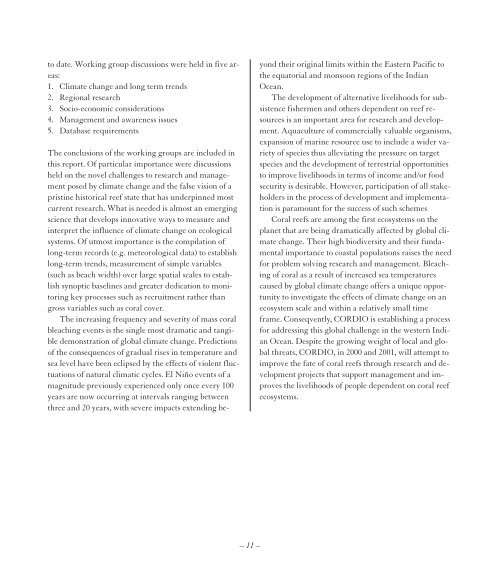You also want an ePaper? Increase the reach of your titles
YUMPU automatically turns print PDFs into web optimized ePapers that Google loves.
to date. Working group discussions were held in five areas:<br />
1. Climate change and long term trends<br />
2. Regional research<br />
3. Socio-economic considerations<br />
4. Management and awareness issues<br />
5. Database requirements<br />
The conclusions of the working groups are included in<br />
this report. Of particular importance were discussions<br />
held on the novel challenges to research and management<br />
posed by climate change and the false vision of a<br />
pristine historical reef state that has underpinned most<br />
current research. What is needed is almost an emerging<br />
science that develops innovative ways to measure and<br />
interpret the influence of climate change on ecological<br />
systems. Of utmost importance is the compilation of<br />
long-term records (e.g. meteorological data) to establish<br />
long-term trends, measurement of simple variables<br />
(such as beach width) over large spatial scales to establish<br />
synoptic baselines and greater dedication to monitoring<br />
key processes such as recruitment rather than<br />
gross variables such as coral cover.<br />
The increasing frequency and severity of mass coral<br />
bleaching events is the single most dramatic and tangible<br />
demonstration of global climate change. Predictions<br />
of the consequences of gradual rises in temperature and<br />
sea level have been eclipsed by the effects of violent fluctuations<br />
of natural climatic cycles. El Niño events of a<br />
magnitude previously experienced only once every 100<br />
years are now occurring at intervals ranging between<br />
three and 20 years, with severe impacts extending beyond<br />
their original limits within the Eastern Pacific to<br />
the equatorial and monsoon regions of the Indian<br />
Ocean.<br />
The development of alternative livelihoods for subsistence<br />
fishermen and others dependent on reef resources<br />
is an important area for research and development.<br />
Aquaculture of commercially valuable organisms,<br />
expansion of marine resource use to include a wider variety<br />
of species thus alleviating the pressure on target<br />
species and the development of terrestrial opportunities<br />
to improve livelihoods in terms of income and/or food<br />
security is desirable. However, participation of all stakeholders<br />
in the process of development and implementation<br />
is paramount for the success of such schemes<br />
Coral reefs are among the first ecosystems on the<br />
planet that are being dramatically affected by global climate<br />
change. Their high biodiversity and their fundamental<br />
importance to coastal populations raises the need<br />
for problem solving research and management. Bleaching<br />
of coral as a result of increased sea temperatures<br />
caused by global climate change offers a unique opportunity<br />
to investigate the effects of climate change on an<br />
ecosystem scale and within a relatively small time<br />
frame. Conseqvently, <strong>CORDIO</strong> is establishing a process<br />
for addressing this global challenge in the western Indian<br />
Ocean. Despite the growing weight of local and global<br />
threats, <strong>CORDIO</strong>, in <strong>2000</strong> and 2001, will attempt to<br />
improve the fate of coral reefs through research and development<br />
projects that support management and improves<br />
the livelihoods of people dependent on coral reef<br />
ecosystems.<br />
– 11 –


















